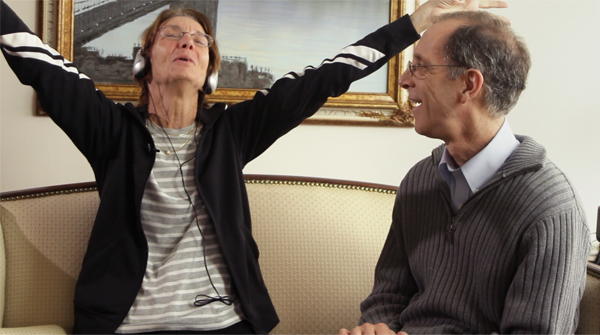
“I will never live in a nursing home!”
This common refrain tells us that the vast majority of long-term care communities are not places for elders to grow and thrive. Instead, too many care communities prioritize cost-effectiveness, staff efficiency and medication distribution over the well-being of the people who live there.
Outrage over the state of long-term care comes in waves, often fuelled by tragic news stories. It can be challenging to sustain that outrage long enough to make effective policy changes to improve the standard of care. Our discomfort with and denial of aging makes it even harder to engage the public in conversation about the serious human rights issues at the core of our failures in long-term care. We are all too happy to turn off the news — to shut off the tragedy and turn on the anti-aging cream commercials.
What is strong enough to push us past our denial? What can help us shift policy and improve care? Well-told stories.
Enter Alive Inside — a documentary made to shake us out of our complacency about long-term care and drive us to make change. Many people might be familiar with the film without having seen it. A clip from the film went viral (reportedly with 7 million views). It shows 92-year-old Henry Dryer, curled into a cocoon-curve in his wheelchair and shutting out the world. But when headphones on an iPod with a personalized song list are slipped over his ears, he opens his eyes wide as though waking from a long, bad dream.
What is the magic in this approach? Is it the music? Research suggests that music is particularly effective for people with a variety of dementia conditions because it taps into emotional memory — a remaining strength, even in the late stages of these conditions. My own experience in bringing the arts — theatre, visual arts, music, dance and poetry — into long-term care settings for nearly 20 years now tells me that the story, and the potential impact, is bigger than that.
The approach of Alive Inside is to bring us along on the journey of Dan Cohen, a social worker, who stumbled upon the fact that a personalized playlist on an iPod enables people to really be enveloped in music and can bring them home to themselves. This is not news to music therapists (or drama, poetry, art or movement therapists), who watch these kinds of miracles happen regularly. But Cohen is an enormously effective Everyman — he is an outsider to the care system who is astonished by the impact of this simple approach in enriching the lives of forgotten souls in long-term care, and who earnestly commits himself to spreading it far and wide. What we learn in Alive Inside is that this is not easy — even if you are giving away free iPods. He is dealing with institutions. They have ways of doing things. And those ways are mighty hard to change.
Filmmaker Michael Rossato-Bennett is particularly adept at capturing the institutional feeling of long-term care. The camera work and editing create quick-paced experiential segments that relay the mind-numbing and alienating environment where people sit, unengaged, in what I call “group solitary confinement.” This makes the miracle moments of coming alive with the music even more pronounced. Interviews with Oliver Sacks, renowned physician, neurologist and author, help explain the brain mechanics behind these “awakenings” — the complexity of the encoding of musical memory and its entanglement with emotional memory. When music is recalled, it brings with it emotional memories that help reestablish a sense of self and self-knowing. In an alienating environment, this can indeed feel miraculous.

Why aren’t nursing home administrators clamouring to sign up for this program? Cohen is perplexed. Several MDs who have spent years trying to reform the system are sympathetic and offer explanation. Bill Thomas, a physician who, through organizations like Eden Alternative and Green House, advocates for the deinstitutionalization of elder care, coaches Cohen through the disheartening reality that long-term care systems are built to prescribe pills, not to purchase iPods and teach staff to use them. Years earlier Thomas had an epiphany similar to Cohen’s, when he saw the impact of creating a more normal homelike environment in long-term care homes with, for example, plants and animals. It proved a long struggle to get even these simple ideas taken up by the system in a meaningful way.
But Alive Inside has a happy ending. When the clip of Cohen’s Music for Memory program goes viral, families of all ages respond with an emotional outpouring that has undoubtedly been heard in the boardrooms of nonprofit and for-profit nursing homes across the world. Music for Memory’s certification program (three webinars and consulting as needed) is now in hundreds of nursing homes across the United States. The care system needed to be pushed by outside pressure to change. The outcry of millions of families also helped shift policy. Wisconsin’s Department of Health Services now pays for 150 of its nursing homes to implement the program and participate in research to understand its impact — all funded with money from fees for violations of regulations in nursing homes.
The film’s ending is hopeful news for families and the long-term care professionals who are committed to change. It also leaves us with a haunting question: will iPods be enough? The residents we meet who come alive are in systems that are still disorienting, limiting their personal freedoms and prioritizing medicines and systems over resident needs.
Music is particularly effective for people with a variety of dementia conditions because it taps into emotional memory.
Now, fuelled by this powerful story, we should be advocating for more changes that can improve standards of care. First, the arts — as both official therapy and a way to enrich the environment — need more research support. Anti-psychotic drugs, so commonly used in nursing homes, have side effects that include death. Poetry, music, dance — integrated and engagement-oriented approaches across all genres — offer promise to build emotional connections, build skills, provide meaning and purpose, and ease stress and anxiety with no negative side effects. We need to better understand how and why these approaches work in order to convince doctors and institutions to kick their prescription addiction.
Second, we need to encourage the funding of arts programs in care settings, whether community- or facility-based. These creative engagement programs are currently experiencing a flowering. My own work with creative storytelling uses a base of improvisation to encourage communication and connection among staff, family and residents/participants. Dance programs, visual art programs, music programs, poetry programs all encourage engagement and connection, and can reduce isolation, depression, medication use and anxious behaviours born of toxic care environments. These programs enrich the environment for everyone — not just the “patients” — and can and should be overseen by therapists who can catch and encourage any necessary shifts in approach that are born of unique, individual illnesses.
That kind of individualized care takes time and therefore money. Because pills are so much easier to distribute (even when they have deadly side effects), these kinds of personalized, expressive programs need all the push that social media and inspiring documentaries can give them. Alive Inside offers a step in this direction. May its impact usher us into meaningful policy change.
Photo: Shutterstock by Halfpoint
Do you have something to say about the article you just read? Be part of the Policy Options discussion, and send in your own submission. Here is a link on how to do it. | Souhaitez-vous réagir à cet article ? Joignez-vous aux débats d’Options politiques et soumettez-nous votre texte en suivant ces directives.







